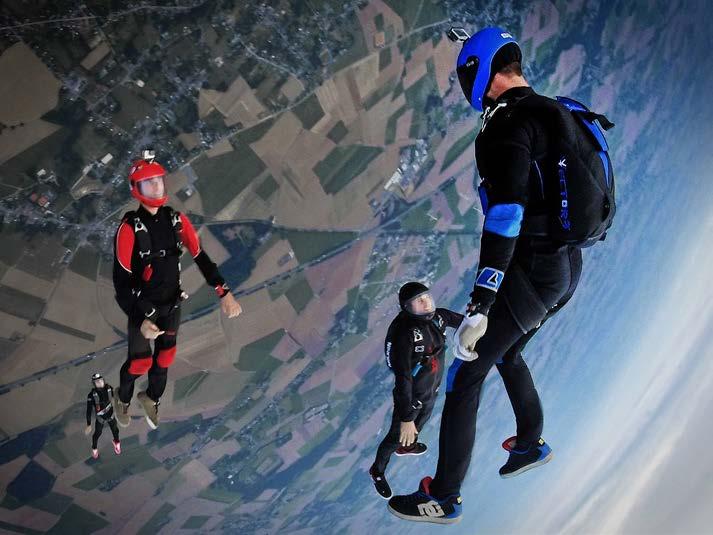
4 minute read
Why so nervous? Singing barbershop is an
Why so nervous? Singing barbershop is an extreme sport!
Why does your body treat performances as if they were a lifethreatening activity? Some tips for retraining your brain’s instincts.
Advertisement
The National Institute of Mental Health reports that public speaking anxiety, or glossophobia, is the most common fear, affecting about 73% of the population. So here we are, an organization that asks our members to stand up in front of judges or audiences and purposely subjects us to the scrutiny of others!
Barbershop singing may not carry the same risks as skydiving, but we ask our members to take risks by being vulnerable on stage. We
PREPARE LIKE AN OLYMPIC CHAMPION • Practice recovery during rehearsals. • Perform often and anywhere (for a school, nursing home, or for your family). • Visualize the day, from waking up to preparation to performance. • Take advantage of the walk-on/mic check so you have a chance to stand on the stage. • Sit in the theater and imagine how you will look to the audience. • Take a few deep breaths in the wings • Open up your body to create a confident illusion. • Listen to the applause - it’s for you. • Find your “yes person” - the one in the audience who is nodding and smiling. • Concentrate on what you are doing instead of how you are doing. • Remember you are not expected to be perfect. • Allow yourself to get in the zone or in flow.

sing our songs through the eyes of an unknown character, in front of an audience or on a contest stage in front of our friends, and even in front of judges. We might as well be on a snowboard at the top of a snow-packed mountain—the rush of adrenaline is the same.
We all seek approval, and with glossophobia, the most common fear is forgetting the plan. The prospect of being the center of attention is terrifying to some, but remember, we set ourselves up for this. The audience sits quietly in the dark, and there we are, standing center stage with bright lights exposing every flaw.
The good news: Barbershoppers don’t sing alone. And these other people are members of your tribe!
MINIMIZE THE FIGHT OR FLIGHT REFLEX
We are programmed to flee or fight. The prefrontal lobes of our brains are programmed to shut down and disconnect from the rest of the brain in times of high anxiety. Oftentimes, that “head talk” starts right about the time you hear the pitch. Dr. Michael DeGeorgia of Case Western University Hospital says, “If your brain starts to freeze up, you get more stressed and the stress hormones go even higher.” Our brain says, “Don’t sing … RUN!”
MINIMIZE THE PERCEPTION OF RISK
The threat area of the brain can’t distinguish between the anxiety of singing in front of an audience and that of deciding whether to dodge an oncoming car. The challenge is to convince our brains that the fear of performing isn’t a life-or-death threat. It may take some practice to truly believe that. We need to explicitly ask ourselves, “What is the worst that can happen?” A mistake might feel horrible in the moment, but the audience will usually forget about it quickly.
REHEARSE HOW TO RECOVER FROM MISTAKES
Since barbershop singing is an
extreme sport, we need to train for it. Instead of stopping the rehearsal each time a mistake is made, start to rehearse recovery. A forgotten note, missed move, additional breath, or a throat glitch might be enough to make you want to stop and do it again – but resist the temptation. Ultimately, if you keep singing and make it through to the end, you will have gained much more confidence in knowing you can recover from an onstage mistake.
LEARN TO GET BACK UP AND TRY AGAIN
A winning skateboard champion falls down a lot during practice, but they get up and do it again despite broken bones and a bruised ego. A skydiver or rock-climber could die if a mistake is made, but I have never heard of a singer dropping dead while performing. But if you asked that skateboard champ, skydiver, or rock-climber to stand up on stage and sing, I’ll bet most will say, “What? No way!” There isn’t much difference between us, really. Each of us sets out to do our best and reach for perfection. Each of us wants the rush.
So next time you have to sing with your quartet or chorus in public, remember that it will not kill you and you will not die alone. Take a

deep breath to reduce anxiety, make eye contact with a friendly face in the audience, sing through the eyes of your character (or your favorite performer) to take the pressure off yourself, and bask in the adrenaline rush of the moment. Remember, what we do is an extreme sport, and that by simply performing in public you are doing better than 73% of the population. n
Sandi Wright is a coach, award-winning director, twotime international quartet champion, and a certified judge in BHS, SAI, and Harmony, Incorporated. wrightsings@gmail.com










